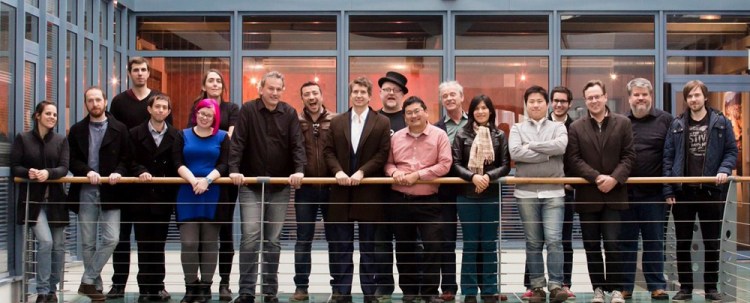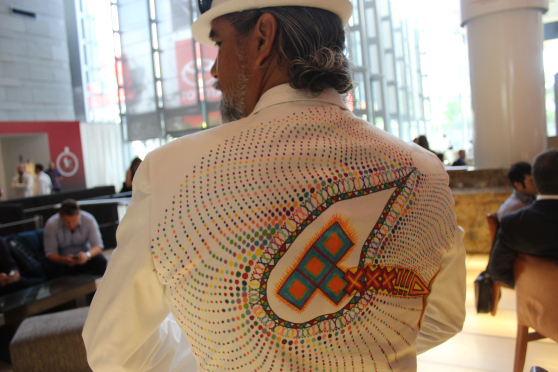If you’re stuck in the office trying to make games or publish them, you should consider the value of bonding. I like to get out to events where I can network with people in gaming and get some face-to-face meetings done. It’s where I learn the most about the $70 billion worldwide industry that games have created. I like to come back with a nugget of a story or some insight that you can’t pick up anywhere else.
Last week, I made a trip to London to see the Playhubs game accelerator and to Marseille, France, for the International Mobile Gaming Awards judging event (Disclosure: The IMGA paid my way to France, but our coverage remains objective), where we picked the best mobile games of 2014.
Afterward, I went to the airport with my fellow judge, Johannes Vuorinen, the co-creator of the mobile gaming hit Badland. We went through security at the airport and sat down at a cafe. Then we saw a poodle running loose in the terminal. It was so scared it pooped on the carpet. A security guard came and picked it up and took it away, but left the poop. Vuorinen and I watched as people walked by, oblivious to the near misses by their feet. We chuckled as each person went by, but Vuorinen’s conscience got to him and he said, “I suppose I ought to pick it up.” He got a bag and tried to scoop it up. Compelled to do good, I had to assist with a napkin.
We saved someone from the rude surprise of stepping in a pile of shit on a carpet in the fine French airport. When I got back, I wrote about Vuorinen’s next project, the Badland Game of the Year Edition, which will take the remastered high-definition version of the game to nine new platforms. As I was writing it, I kept smiling and thinking about that poodle and whether it was reunited with its owner. It also reminded me of a comment from one of the judges about whether we should do an award for “best game for shitty devices.”
Next week, I’ll be having some new bonding experiences at the DICE Summit in Las Vegas along with our senior editor Dale North. The show is in its 14th year, and I’ve never missed one of these gatherings of the elite award-winning developers and executives of the game industry.
I have fond memories of DICE through the years. At one early DICE Summit, I got the scoop on the patents that Sony was collecting for the Cell processor used in the PlayStation 3 game console. I really enjoyed interviewing Jenova Chen, cofounder of Thatgamecompany, as he described making the game of the year, Journey, and then nearly going out of business. It was an honor for me to be immortalized as a Lara Croft cross-dresser in a poem by gaming sage Bing Gordon on the Golden Age of Gaming at the 2011 DICE Summit. It was also a joy to interview the funny gaming geeks Felicia Day and Freddie Wong, the co-hosts of last year’s DICE Awards, which are like the Oscars of gaming.
This year, the event features speakers talking about a theme “Without Borders,” where game makers can realize their visions for games without the restrictions of territorial, cultural, or technological borders, said Martin Rae, president of the Academy of Interactive Arts & Sciences, which puts on the event and its accompanying DICE Awards, in an interview.
“Everything has really opened up so all of the borders in the business are breaking down,” Rae said. “We thought that was a nice way to underscore what is happening in the industry. There isn’t much we can’t do in this industry if you have a great idea, have a vision, and want to work hard.”
This year’s event features talks from Brandon Beck, the reclusive CEO of Riot Games, the maker of League of Legends; Mark Lamia, head of Call of Duty studio Treyarch; Brenda Romero, the firebrand program director at the University of California at Santa Cruz; Tom Kalinske, the marketer who made Sega into a great force in the console wars of the 1990s; Chris Roberts, the creator of Star Citizen, which has raised $71 million via crowdfunding; and Henk Rogers and Alexey Pajitnov, who duo who turned Tetris into a global gaming phenomenon more than three decades ago.
Casual Connect Europe happens to be the same week at the DICE Summit in Amsterdam. I won’t make it there, but we’ll send our GamesBeat freelance writer Daniel Crawley from England to cover the event. Hopefully Crawley will avoid staying in the marijuana cafes of Amsterdam and listen to some cool talks about the making of mobile games like Kim Kardashian: Hollywood and World of Tanks: Blitz. Casual Connect Europe is much more about the mobile frontier and the globalization of games, while DICE’s focus has been on the core of the console industry in the past. Each event has a slightly different personality and its own take on gaming’s future.
The biggest near-term event will be the Game Developers Conference during the week of March 2 in San Francisco. The GDC is much larger with more than 25,000 attendees, but it’s still the source of some great memories, like Bill Gates launching the original Xbox at the GDC in 2000. This year, Brenda Romero, who has made games for more than three decades, will get an award for game design (for titles like Wizardry and Jagged Alliance), teaching, and advocacy. Another award will got to pioneer David Braben, who co-developed the seminal “open world” 3D space trading game Elite with Ian Bell in the early 1980s. The GDC is a vast event but one that celebrates the people who do the actual making of the games that steal so much of our time.
We’ll have our own face-to-face time on May 5-6, at our first annual GamesBeat Summit in Sausalito, Calif., just north of San Francisco. Our event will feature a contest for the industry’s business leaders. One award will be for the best business decision in gaming, and the other will be for the most candid talk. I’m hoping to draw an elite crowd to the Cavallo Resort for our event and to create some new bonding experiences that have to do with something other than poop on carpet.
VentureBeat's mission is to be a digital town square for technical decision-makers to gain knowledge about transformative enterprise technology and transact. Learn More




